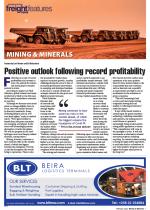Nigeria is one of Africa’s fastest-emerging gold destinations as the country sets out to diversify away from oil and gas.According to Chimwemwe Chalemera, country director, UK Department for International Trade, Nigeria holds significant opportunity. “The past two years have been incredibly difficult, not only for Nigeria but for most economies around the world. In Nigeria itself businesses have had to be extremely agile, adopting new ways of operating under a new set of circumstances.”She said Nigeria, however, was strategically positioned for the new dawn expected to be seen in the mining sector at large.Segun Lawson, CEO of Thor Explorations, Africa’s newest gold producer, said the country had immense geological potential, which was boosted by strong governmental support for the mining sector and a largely established industrial base.Thor Explorations, which owns and operates the Segilola open-pit mine where the first gold was poured in July last year, is growing a portfolio of high-quality West African exploration assets, with projects under way in Senegal and Burkina Faso as well.“It is, however, in Nigeria where we are seeing some very exciting developments,” said Lawson during an online event recently. “We have fully financed, constructed and commissioned a gold mine with the aim of producing 90 000 ounces of gold in 2022. Already we have plans in place to extend the original mine life – and after further exploration, the opportunity to grow this gold resource is very high. We believe that thanks to the extent of the reserve and the depth thereof, there is a real chance that we will be transitioning this to an underground operation in the f uture.”According to Alamin Malami of the Nasarawa State’s investment and development agenc y, Na sida , it is not just gold that offers opportunity. “Nasarawa State holds real mining opportunity, sitting on huge deposits of minerals, including an estimated 123.8 million tons of coal,” he said. Other resources include bauxite, iron ore, baryte, gypsum, kaolin, limestone, marble and zinc, which are all yet to be exploited.“In this state alone there are currently 351 mining licence holders for various states. It is, however, important to note that of these at least 95% are as yet not being utilised.”With this in mind, he said, government officials were moving quickly to set the pace and create a conducive business environment for a regulated and value-added mining industry that could attract viable public-private partnerships and investments.“Growing the mining sector in Nigeria is a priority,” said Malami.Plans were also under way for the development of an industrial logistics park in Gudi in Nigeria to serve the mining sector. “We are currently in the process of finding investors for this project, which we see as critical to developing the mining sector.”Gudi is not only centrally located to serve as a logistics hub for the north central region of Nigeria, but its profile makes it ideal as a transit route to different parts of the country. “We foresee this hub to be a free trade zone, with structures in place critical to the mining industry.”Nigeria had several benefits working to its advantage which would enable it to grow its mining sector, said Lawson. “First and foremost is the strong banking and financial sector, as well as the stable political environment. The government is actively encouraging investment in the mining sector as it looks to diversify its economy, and efforts are being made to create a friendly, ease-of-business environment. The good access to labour and the large population bode well for mining in the country.”Recent media reports indicate the Nigerian government has already poured as much as $50 million into the exploration of gold, lithium and other metals as part of its efforts to grow the sector.
Nigeria sets its sights on gold exploration
24 Feb 2022 - by -
0 Comments
Mining & Minerals Feature February 2022

24 Feb 2022
24 Feb 2022
24 Feb 2022
24 Feb 2022
24 Feb 2022
24 Feb 2022
24 Feb 2022
24 Feb 2022
24 Feb 2022
24 Feb 2022
24 Feb 2022
Border Beat
Today 11:30
11 Feb 2025
Featured Jobs
New
New
New
